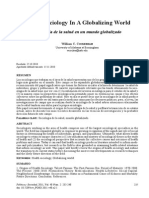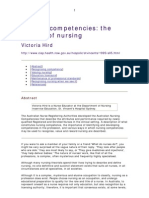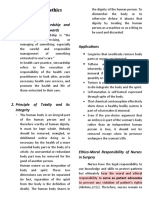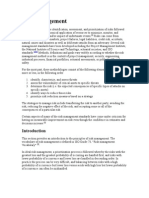Tertiary Prevention
Tertiary Prevention
Uploaded by
JULIE ANN ABAYONCopyright:
Available Formats
Tertiary Prevention
Tertiary Prevention
Uploaded by
JULIE ANN ABAYONCopyright
Available Formats
Share this document
Did you find this document useful?
Is this content inappropriate?
Copyright:
Available Formats
Tertiary Prevention
Tertiary Prevention
Uploaded by
JULIE ANN ABAYONCopyright:
Available Formats
c.
) Tertiary Prevention
Tertiary prevention differs from the first two categories. It focuses on lowering the long-term effects of
the disease by assisting patients in managing their illnesses and chronic symptoms. Tertiary prevention
aims to create an enhanced quality of life while also increasing overall life expectancy by preventing
difficulties in the future. Tertiary prevention is the most expensive and time-consuming for the healthcare
system because of the high expenditures of surgery and the ongoing management of chronic disease
through medicine and rehabilitation.
Promoting Holistic Mental Health Wellness
According to the National Center for Mental Health (NCMH), there has been a considerable increase in
monthly hotline calls regarding depression as a result of the COVID-19 epidemic, with numbers
increasing from 80 calls prior to the lockdown to over 400 calls currently. These figures highlight the
need for additional dialogues and activities to help eliminate the stigma associated with mental health.
Filipinos frequently may not feel comfortable discussing their mental health problems for fear of being
alienated or prejudiced by their peers.
To address mental health issues, the Department of Health adopted a multi-sectoral approach that includes
programs and interventions in a variety of venues directed at high-risk groups. On the 2nd of May, the
National Center for Mental Health Crisis Hotline established the "Kamusta Ka? Tara Usap Tayo," a
psychosocial service hotline that is available 24 hours a day, seven days a week for immediate
psychological first assistance. The “UPD PsychServ” also offered free telephone therapy to first
responders through their network of contacts. The Mental Health Act, also known as RA 11036, requires
the provision of broad suicide prevention services, which include crisis intervention and a response
strategy, on a national scale, to all people in need.
https://www.who.int/philippines/news/detail/10-09-2020-doh-and-who-promote-holistic-mental-health-
wellness-in-light-of-world-suicide-prevention-day
Free Medicine to Filipino patients diagnosed with diabetes
During World Diabetes Day (WDD) celebrations Thursday, November 23, the DOH, along with non-
government and private sector partners, urged Filipinos to take early preventive action against diabetes.
Be Risk Aware.
WDD was celebrated at the Quezon Memorial Circle with about 1000 participants from the public, non-
profit, and private sectors. Activities included a parade/walk around the circle, Zumba, free diabetes
screenings, and the creation of a human blue circle, the global symbol of diabetes awareness. A lay forum
was also held to educate participants on diabetes and its risk factors.
According to the Philippine Center for Diabetes Education Foundation, diabetes is the 6th leading cause
of death among Filipinos. It is a chronic disease characterized by high blood sugar levels (hyperglycemia)
due to insufficient insulin production or action. Diabetes uncontrolled causes serious complications like
stroke, heart attack, kidney failure, and diabetic retinopathy. Diabetes retinopathy caused 5% of global
blindness in 2002.
The DOH, as the country's leading public health agency, leads nationwide efforts to prevent and control
diabetes and its complications. For more information, visit www.doh.gov.ph/diabetes-risk-screening. The
DOH also provides free oral anti-diabetes medications and insulin to Filipino diabetics. The DOH has
formed a cooperation with the Philippine Society of Endocrinology, Diabetes and Metabolism (PSEDM)
to empower and train primary healthcare workers in diabetes management. Over 1,700 health care
practitioners were previously trained across the country.
https://doh.gov.ph/node/11786
You might also like
- The Subtle Art of Not Giving a F*ck: A Counterintuitive Approach to Living a Good LifeFrom EverandThe Subtle Art of Not Giving a F*ck: A Counterintuitive Approach to Living a Good LifeRating: 4 out of 5 stars4/5 (5984)
- The Gifts of Imperfection: Let Go of Who You Think You're Supposed to Be and Embrace Who You AreFrom EverandThe Gifts of Imperfection: Let Go of Who You Think You're Supposed to Be and Embrace Who You AreRating: 4 out of 5 stars4/5 (1112)
- Never Split the Difference: Negotiating As If Your Life Depended On ItFrom EverandNever Split the Difference: Negotiating As If Your Life Depended On ItRating: 4.5 out of 5 stars4.5/5 (898)
- Hidden Figures: The American Dream and the Untold Story of the Black Women Mathematicians Who Helped Win the Space RaceFrom EverandHidden Figures: The American Dream and the Untold Story of the Black Women Mathematicians Who Helped Win the Space RaceRating: 4 out of 5 stars4/5 (932)
- Grit: The Power of Passion and PerseveranceFrom EverandGrit: The Power of Passion and PerseveranceRating: 4 out of 5 stars4/5 (619)
- Shoe Dog: A Memoir by the Creator of NikeFrom EverandShoe Dog: A Memoir by the Creator of NikeRating: 4.5 out of 5 stars4.5/5 (546)
- The Hard Thing About Hard Things: Building a Business When There Are No Easy AnswersFrom EverandThe Hard Thing About Hard Things: Building a Business When There Are No Easy AnswersRating: 4.5 out of 5 stars4.5/5 (357)
- Her Body and Other Parties: StoriesFrom EverandHer Body and Other Parties: StoriesRating: 4 out of 5 stars4/5 (831)
- Elon Musk: Tesla, SpaceX, and the Quest for a Fantastic FutureFrom EverandElon Musk: Tesla, SpaceX, and the Quest for a Fantastic FutureRating: 4.5 out of 5 stars4.5/5 (477)
- Module 6 - NC II - Presenting Relevant Information - FinalDocument59 pagesModule 6 - NC II - Presenting Relevant Information - FinalLloydie Lopez100% (18)
- The Emperor of All Maladies: A Biography of CancerFrom EverandThe Emperor of All Maladies: A Biography of CancerRating: 4.5 out of 5 stars4.5/5 (275)
- The Little Book of Hygge: Danish Secrets to Happy LivingFrom EverandThe Little Book of Hygge: Danish Secrets to Happy LivingRating: 3.5 out of 5 stars3.5/5 (425)
- The World Is Flat 3.0: A Brief History of the Twenty-first CenturyFrom EverandThe World Is Flat 3.0: A Brief History of the Twenty-first CenturyRating: 3.5 out of 5 stars3.5/5 (2272)
- The Yellow House: A Memoir (2019 National Book Award Winner)From EverandThe Yellow House: A Memoir (2019 National Book Award Winner)Rating: 4 out of 5 stars4/5 (99)
- The Sympathizer: A Novel (Pulitzer Prize for Fiction)From EverandThe Sympathizer: A Novel (Pulitzer Prize for Fiction)Rating: 4.5 out of 5 stars4.5/5 (125)
- Devil in the Grove: Thurgood Marshall, the Groveland Boys, and the Dawn of a New AmericaFrom EverandDevil in the Grove: Thurgood Marshall, the Groveland Boys, and the Dawn of a New AmericaRating: 4.5 out of 5 stars4.5/5 (270)
- Team of Rivals: The Political Genius of Abraham LincolnFrom EverandTeam of Rivals: The Political Genius of Abraham LincolnRating: 4.5 out of 5 stars4.5/5 (235)
- A Heartbreaking Work Of Staggering Genius: A Memoir Based on a True StoryFrom EverandA Heartbreaking Work Of Staggering Genius: A Memoir Based on a True StoryRating: 3.5 out of 5 stars3.5/5 (232)
- On Fire: The (Burning) Case for a Green New DealFrom EverandOn Fire: The (Burning) Case for a Green New DealRating: 4 out of 5 stars4/5 (75)
- Cockerman Sociologia de La MedicinaDocument14 pagesCockerman Sociologia de La MedicinaFranklinBarrientosRamirez100% (1)
- The Unwinding: An Inner History of the New AmericaFrom EverandThe Unwinding: An Inner History of the New AmericaRating: 4 out of 5 stars4/5 (45)
- Q4 MAPEH 10 TOS (AutoRecovered)Document3 pagesQ4 MAPEH 10 TOS (AutoRecovered)JULIE ANN ABAYONNo ratings yet
- Mapeh 10: Written Works For Quarter 2Document8 pagesMapeh 10: Written Works For Quarter 2JULIE ANN ABAYONNo ratings yet
- MLSP W2 LaboratoryDocument1 pageMLSP W2 LaboratoryJULIE ANN ABAYON100% (1)
- Activity. Perfect CombinationDocument1 pageActivity. Perfect CombinationJULIE ANN ABAYONNo ratings yet
- English 10 Q2 Periodic Exam Blooms TaxonomyDocument6 pagesEnglish 10 Q2 Periodic Exam Blooms TaxonomyJULIE ANN ABAYONNo ratings yet
- MLSP Francisco ObeDocument1 pageMLSP Francisco ObeJULIE ANN ABAYONNo ratings yet
- W4 Sa Stas Mga BadingDocument10 pagesW4 Sa Stas Mga BadingJULIE ANN ABAYONNo ratings yet
- Francisco, Jezaliel KayeDocument2 pagesFrancisco, Jezaliel KayeJULIE ANN ABAYONNo ratings yet
- Grade 7: Daily Lesson PlanDocument6 pagesGrade 7: Daily Lesson PlanJULIE ANN ABAYONNo ratings yet
- Pharmacology A Prescription and Math Calculation-NewDocument18 pagesPharmacology A Prescription and Math Calculation-NewJULIE ANN ABAYONNo ratings yet
- SLE-manipulatives FinalDocument4 pagesSLE-manipulatives FinalJULIE ANN ABAYONNo ratings yet
- Least Learned in Math Q1Document2 pagesLeast Learned in Math Q1JULIE ANN ABAYONNo ratings yet
- First Quarter ExamDocument26 pagesFirst Quarter ExamJULIE ANN ABAYONNo ratings yet
- Week 4 - Steps in Critical Reading-1Document8 pagesWeek 4 - Steps in Critical Reading-1JULIE ANN ABAYONNo ratings yet
- CRWT Week 5Document31 pagesCRWT Week 5JULIE ANN ABAYONNo ratings yet
- CRWT Week 3Document18 pagesCRWT Week 3JULIE ANN ABAYONNo ratings yet
- Minutes of The 2ND ParentsDocument5 pagesMinutes of The 2ND ParentsJULIE ANN ABAYONNo ratings yet
- Allama Iqbal Open University, IslamabadDocument4 pagesAllama Iqbal Open University, IslamabadJiya ShafaqNo ratings yet
- Emphysema Case Study AnalysisDocument10 pagesEmphysema Case Study AnalysisEfren VisteNo ratings yet
- Chemicals Zetag MSDS Powder Magnafloc 1011 - 0810Document6 pagesChemicals Zetag MSDS Powder Magnafloc 1011 - 0810PromagEnviro.comNo ratings yet
- Accomplishment ReportDocument25 pagesAccomplishment Reportrosales mdrrmoNo ratings yet
- Nursing Competencies. The Artristy of NursingDocument6 pagesNursing Competencies. The Artristy of NursingneoclintNo ratings yet
- Care, Cure, Core TheoryDocument17 pagesCare, Cure, Core TheoryLouzcelle DAPATNo ratings yet
- SDS - Epotec Yd 128Document9 pagesSDS - Epotec Yd 128Hendra SeptaNo ratings yet
- Questionnaire On AbsenteeismDocument2 pagesQuestionnaire On AbsenteeismCharmaine Joy Aguilar MendozaNo ratings yet
- Antibiotic Cross-Sensitivity ChartDocument1 pageAntibiotic Cross-Sensitivity ChartChing JuNo ratings yet
- Principles of BioethicsDocument3 pagesPrinciples of BioethicsXandra BasnilloNo ratings yet
- Human Digestive System WorksheetDocument3 pagesHuman Digestive System WorksheetMoath AlsaidNo ratings yet
- SITHCCC014 Learner Workbook V1.0Document7 pagesSITHCCC014 Learner Workbook V1.0Talha NaseemNo ratings yet
- Standard ToR MoEFCCDocument9 pagesStandard ToR MoEFCCBharat AroraNo ratings yet
- PAS 320 Guia de Cultura de Inocuidad (26-36)Document11 pagesPAS 320 Guia de Cultura de Inocuidad (26-36)Luis GallegosNo ratings yet
- Hypersensitivity: M.G.Rajanandh, Dept. of Pharmacy Practice, SRM College of Pharmacy, SRM UniversityDocument87 pagesHypersensitivity: M.G.Rajanandh, Dept. of Pharmacy Practice, SRM College of Pharmacy, SRM UniversityJulienne Sanchez-SalazarNo ratings yet
- AdvtNo 52 2024Document27 pagesAdvtNo 52 2024ArtiNo ratings yet
- A Cyber-Security Model For Private Hospitals - A Case Study of A Group of Hospital in Nairobi, Kenya - AbstractDocument1 pageA Cyber-Security Model For Private Hospitals - A Case Study of A Group of Hospital in Nairobi, Kenya - AbstractnimoNo ratings yet
- Current Concepts of Damage Control Resuscitation and Damage Control SurgeryDocument52 pagesCurrent Concepts of Damage Control Resuscitation and Damage Control SurgerydewiswahyuNo ratings yet
- HOPE2 11 Q3 W1 7 Modified AssessmentDocument11 pagesHOPE2 11 Q3 W1 7 Modified AssessmentAloha Reign PaloNo ratings yet
- MDD Classification Document: Mapping of RequirementsDocument12 pagesMDD Classification Document: Mapping of Requirementsdhir.ankurNo ratings yet
- Florida Companies ListDocument3 pagesFlorida Companies ListFaraz SMFZNo ratings yet
- IrishMaeRESEARCH CHAP123Document23 pagesIrishMaeRESEARCH CHAP123Irish IbanezNo ratings yet
- Format or A Is 20062510Document2 pagesFormat or A Is 20062510ScribdTranslationsNo ratings yet
- Risk ManagementDocument10 pagesRisk Managementlove0lust67% (3)
- Session Plan Sector Qualification Title Unit of Competency Module Title Learning OutcomesDocument4 pagesSession Plan Sector Qualification Title Unit of Competency Module Title Learning OutcomesMay BonitaNo ratings yet
- PATHFIT 2F - InfographicDocument3 pagesPATHFIT 2F - InfographicAnthony HilarioNo ratings yet
- Guided Imagery: Mountain Cabin Scene ExerciseDocument2 pagesGuided Imagery: Mountain Cabin Scene ExerciseDuc Luyen NguyenNo ratings yet






















































































